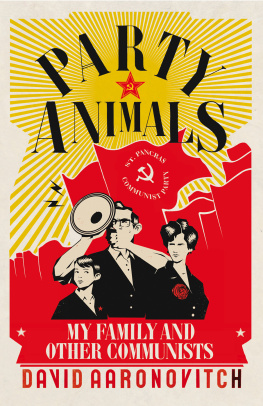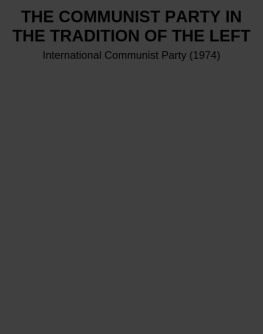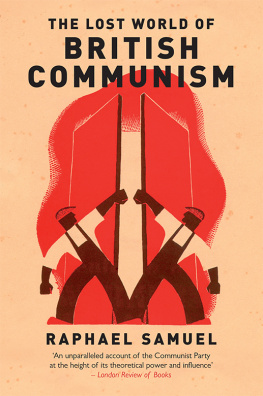Francis Beckett - Enemy Within: The Rise and Fall of the British Communist Party
Here you can read online Francis Beckett - Enemy Within: The Rise and Fall of the British Communist Party full text of the book (entire story) in english for free. Download pdf and epub, get meaning, cover and reviews about this ebook. year: 1998, publisher: Merlin Press, genre: Non-fiction. Description of the work, (preface) as well as reviews are available. Best literature library LitArk.com created for fans of good reading and offers a wide selection of genres:
Romance novel
Science fiction
Adventure
Detective
Science
History
Home and family
Prose
Art
Politics
Computer
Non-fiction
Religion
Business
Children
Humor
Choose a favorite category and find really read worthwhile books. Enjoy immersion in the world of imagination, feel the emotions of the characters or learn something new for yourself, make an fascinating discovery.
- Book:Enemy Within: The Rise and Fall of the British Communist Party
- Author:
- Publisher:Merlin Press
- Genre:
- Year:1998
- Rating:5 / 5
- Favourites:Add to favourites
- Your mark:
- 100
- 1
- 2
- 3
- 4
- 5
Enemy Within: The Rise and Fall of the British Communist Party: summary, description and annotation
We offer to read an annotation, description, summary or preface (depends on what the author of the book "Enemy Within: The Rise and Fall of the British Communist Party" wrote himself). If you haven't found the necessary information about the book — write in the comments, we will try to find it.
Enemy Within: The Rise and Fall of the British Communist Party — read online for free the complete book (whole text) full work
Below is the text of the book, divided by pages. System saving the place of the last page read, allows you to conveniently read the book "Enemy Within: The Rise and Fall of the British Communist Party" online for free, without having to search again every time where you left off. Put a bookmark, and you can go to the page where you finished reading at any time.
Font size:
Interval:
Bookmark:

Enemy Within
The Rise and Fall of the British
Communist Party
FRANCIS BECKETT
Merlin Press
Francis Beckett 1995
First published 1995
by John Murray (Publishers) Ltd.
50 Albemarle Street, London W1X 4BD
This edition published in paperback 1998 in the UK
by The Merlin Press Ltd.
2 Rendlesham Mews Rendlesham Woodbridge
Suffolk IP12 2SZ
The moral right of the author has been asserted
All rights reserved. No part of this publication may be reproduced in any material form (including photocopying or storing it in any medium by electronic means and whether or not transiently or incidentally to some other use of this publication) without the written permission of the copyright owner, except in accordance with the provisions of the Copyright, Designs and Patents Act 1988 or under the terms of a licence issued by the Copyright Licensing Agency, 90 Tottenham Court Road, London W1P 9HE. Applications for the copyright owners written permission to reproduce any part of this publication should be addressed to the publisher.
ISBN 085036 477 9
This book is for Paul Beckett (1976 88)
because ideas of fairness and
not exploiting others mattered to him.
Printed in Finland by WSOY
My thanks are due to more people than I can count. Communist historians have been consistently kind, helpful, honest and supportive. Chief among them my thanks must go to the tireless Monty Johnstone who has been generous with his deep knowledge. Monty, a Communist who has spent many years of his life making sure that the darkest secrets of international Communism are not swept under the carpet, has also read large chunks of this book, corrected some factual errors and made a series of thoughtful and informed comments.
The CPs official historian, Noreen Branson, has also been kind and helpful, even to the extent of letting me read in manuscript her next volume, covering the years 1941 to 1951 and to be published in 1995. To another Communist historian, Mike Squires, I feel I owe an apology. It seems poor thanks for his generous help that I have firmly rejected the deeply felt view contained in his scholarly PhD thesis on the CPs early years while shamelessly drawing on it for information. Another professional historian to whom I owe much is Kevin Morgan, Harry Pollitts biographer, who has been generous with his considerable knowledge and understanding.
Two journalists have read some of the later chapters. I owe much to perceptive comments, as well as factual corrections, from Mick Costello and Andrew Murray. Four other people have read individual chapters and commented helpfully on them, as well as allowing me to interview them at great length and pick their brains: Martin Green, Douglas Hyde, Wilf Page and Brian Pollitt. Douglas Hyde and Brian Pollitt have also been invaluable sources of guidance and information throughout; and Wilf Page has kindly allowed me to read and quote from his extraordinary and vivid autobiographical notes, which, if this were a society that valued an understanding of its roots, would be fought over by publishers.
The early chapters owe a great deal to my trawl through the Comintern archives in Moscow. I could only do this because Pieta Monks came with me, bringing her fluent Russian and her deep understanding of Moscow and its ways, gained from long study at Moscow University. She and her many Russian friends also translated some Comintern material for me.
I have been very grateful for the advice and encouragement of the custodians of the CPs archives, George Matthews and Francis King. The remarkable Comintern document quoted at length in Chapter 5, and more briefly again in Chapter 8, was not my find, but was obtained by the archives while I was researching this book. They kindly allowed me to use it, and to work from Francis Kings excellent translation. Equally I have received nothing but help and encouragement from the staff at the Marx Memorial Library led by Tish Newland. The Guardian kindly allowed me to use its cuttings library, whose staff were unfailingly helpful.
I also want to thank Linda Cohen, for two reasons. First, as a highly efficient researcher, she did much of the preliminary work and drew up a marvellous chronology which has served to keep my mind as clear as there was any chance of it being; and second, as the mother of my children, she has kept them away from me through the long evenings when I was chained to the word processor.
Two people have helped me to get particular stories. Joyce Rathbone has been enormously helpful with information about her aunt, Rose Cohen. And former Daily Worker journalist Alison McLeod has generously given me access to her notes and memories of 1956 as well as her fascinating unpublished manuscript about it, The Death of Uncle Joe. Without her Chapter 8 would be much poorer.
This book owes a great deal to interviews generally in person and taped, but sometimes on the telephone with most of the above mentioned people, and also with Frank Chappie, Tony Chater, Dick Clements, Edith Constable, Marian Darke, Reuben Falber, Michael Foot, Professor John Foster, Peter Fryer, Jack Gaster, Ken Gill, Anita Halpin, Kevin Halpin, Mike Hicks, Digby Jacks, Martin Jacques, Jack Jones, Roy Jones, Paula Lanning, Martin Linton, Denis MacShane, Mick McGahey, Gordon McLennan, Chris Myant, Steve Parry, Phil Piratin, the late Bert Ramelson, Mary Rosser, Sam Russell, John Saville, Phil Stein, Jim Tait and Nina Temple.
Arnold Wesker engaged in a most helpful correspondence with me. The late Bill Keys talked to me and gave me parts of his diary while I was working on another project and I have used the material here. Stanley Forman, custodian of the Communist Partys film archive, gave me free run of it and a characteristically urbane and exciting guided tour through it.
Talks over the years with many friends and colleagues have formed such understanding as I have of politics, Communism and the period of history in which the CP lived. I am not sure if I can still remember who they all are, but they certainly include Eddie Barrett, Clare Beckett, Jack Boddy, Mike Brereton, Marie Buchanan, Malcolm Clarke, Professor Colin Holmes, Jim Innes, Chris Jones, Chris Kaufman, Ellis Kopel, Jo Sinclair and Linden West.
I want also to thank Julian Alexander, a creative, exacting and supportive literary agent, and Grant McIntyre and Kate Chenevix Trench, who are careful, thoughtful and understanding editors.
A middle-aged man in a shabby raincoat stood in drizzling rain outside the TUCs central London headquarters that cold November morning in 1991 selling the Communist newspaper, the Morning Star. The Morning Star has dedicated supporters prepared to turn out in all weathers to sell the paper. But this was a bad morning he sold only eighteen copies.
Yet 213 people passed him on their way into the TUC for a meeting the forty-third and last Congress of the Communist Party of Great Britain (henceforth CP). They were there to wind up their party after seventy-one years and create a new organization which rejected most traditional Communist beliefs and ways of working. And they were doing it just 50 yards down the road from the British Museum where, more than a century before, Karl Marx had worked out the Communist philosophy they were about to abandon.
These were people more likely to buy the Daily Telegraph than the Morning Star. The Star was run by those who were expelled from the Party in the mid-1980s. The CP, down to less than 5000 members from a wartime peak of 56,000, called the
Font size:
Interval:
Bookmark:
Similar books «Enemy Within: The Rise and Fall of the British Communist Party»
Look at similar books to Enemy Within: The Rise and Fall of the British Communist Party. We have selected literature similar in name and meaning in the hope of providing readers with more options to find new, interesting, not yet read works.
Discussion, reviews of the book Enemy Within: The Rise and Fall of the British Communist Party and just readers' own opinions. Leave your comments, write what you think about the work, its meaning or the main characters. Specify what exactly you liked and what you didn't like, and why you think so.

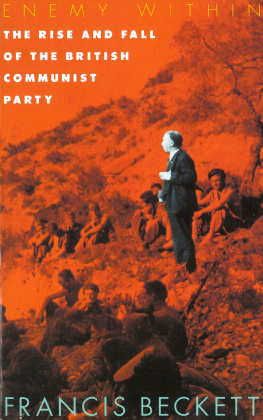

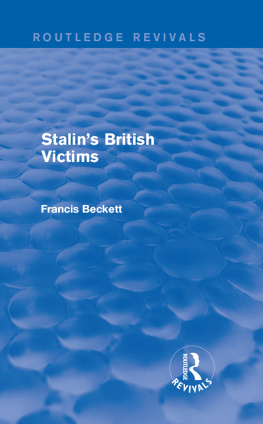
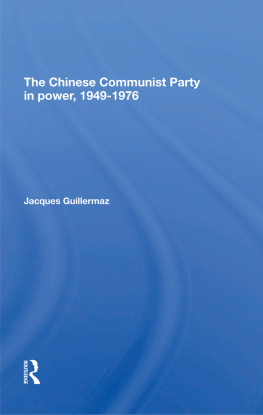
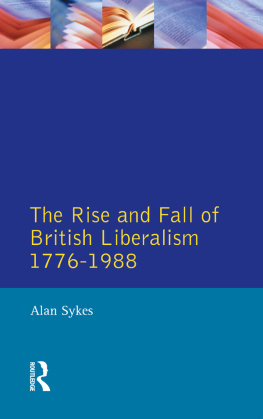
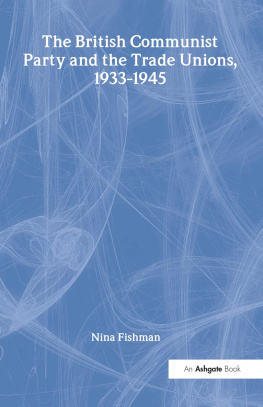
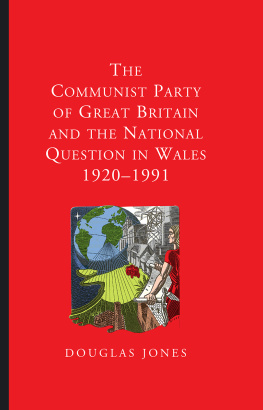
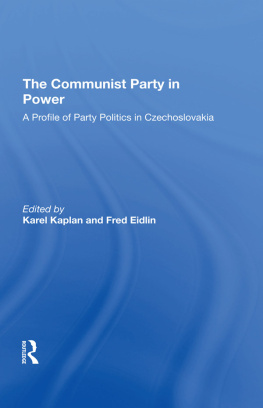
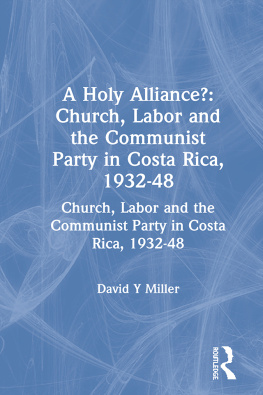
![Communist Party of PeruCommunist Party of Peru - Shining - The Collected Works of the Communist Party of Peru. 1968-1999 [Warning: Hate Speech and Negationism]](/uploads/posts/book/267146/thumbs/communist-party-of-perucommunist-party-of-peru.jpg)
